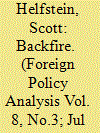| Srl | Item |
| 1 |
ID:
114132


|
|
|
|
|
| Publication |
2012.
|
| Summary/Abstract |
States attempting surprise attacks usually achieve tactical success in catching an opponent unprepared. Many studies of surprise do not look beyond the opening bolt from the blue to examine the impact of surprise based on the broader strategic objectives. A comparative case study of centrally planned surprise attacks from 1950 to 1990 suggests that surprise rarely achieves strategic ends. They did not deter the targets from military action, and more surprisingly, did not contribute to less deadly wars. This runs counter to conventional beliefs about surprise, since attacks are supposed to impair a target's desire or ability to mount a military response. Instead, the most damaging surprises are followed by particularly bloody conflict, a phenomenon referred to here as backfire. The article examines a number of possible strategic explanations for this empirical pattern and ultimately concludes that behavioral decision-making processes characterized by prospect theory offer the best possible explanation. An increased propensity for risk, resulting from the losses suffered during a large surprise, drives target military reaction despite the lower likelihood of success.
|
|
|
|
|
|
|
|
|
|
|
|
|
|
|
|
| 2 |
ID:
081249


|
|
|
|
|
| Publication |
2008.
|
| Summary/Abstract |
This study seeks to adjudicate between the two schools of intelligence: the "Orthodox School" which argues that the inherent pathologies and obstacles in the intelligence work make a significant degree of successful surprise inevitable in almost all attempts and the "Revisionist School" which asserts that the roots of surprise attacks lie in avoidable mistakes of certain intelligence officials. By examining the classic case of the Yom Kippur surprise attack, the paper finds the middle ground between the two schools. It distinguishes between the real limits facing analysts and surmountable obstacles. Based on this distinction it determines which problems can be corrected or mitigated and which cannot. It also provides criteria to determine the varying levels of difficulty for predicting attacks. Finally, it finds that intelligence inevitably involves making subjective judgments and utilizing experience correctly, and therefore successful prediction depends on the quality of the analysts
|
|
|
|
|
|
|
|
|
|
|
|
|
|
|
|